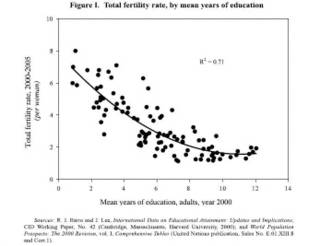Not tonight dear, I have a mid-term. Plus: the P-turn.
Ernie's blog has some pretty cool stuff on it sometimes, like this chart on fertility rates of gals compared to education levels.

Hmmmm...do smarter women have fewer kids, or does it just costs too much?
In Korea more women are having fewer kids, or is it: fewer women are having many kids? It seems this is a problem, but I'm not exactly sure why; there are tons of people here and whoever can seems to be emigrating (for a while or forever). There's like 1 million Koreans in L.A., 125,000 in Toronto and over 50,000 now in Vancouver, Canada. I guess if fertility does go down then that could hurt consumerism here, but they can always (as in the past, and getting better at it with world-beating companies) export. Besides, Korea is so populated that the government is even looking at markets to import basic Korean foods like 대두/daedoo or red bean, 고추/gochoo or hot peppers and soybeans. So I don't think undercrowding is the problem here.
If the government wants to get women to have more kids there are a few ways to go about it: in Canada almost all families get a Baby Bonus (it's not a lot, but it can cover basic expenses); in Sweden and other countries there is free daycare, laws that allow generous maternity leave and even leave for fathers to stay at home to raise the kids (something that is rare here: see articles here and here)); and many companies have daycares right in the factory or office building to allow mothers to be closer to their children but still get their jobs done.
In Korea virtually none of these are in place. Virtually ALL of the child-rearing responsibilities falls on the mother (and her mother, her husband's mother and/or any other female relatives who are closeby or can spare time). Now, I don't think this is necessarily a bad thing. I believe it's best for a child to be cared for by its kin rather than some worker--the bond is more important than the title. But, if the mother has to be at home because no one is available or willing to shoulder the burden (traditionally families all lived under one roof, but Koreans are becoming more Western and adopting a nuclear family approach somewhat) then that means the mother cannot work. Knowing this before having children (or before having the next one) one might just put off the whole ordeal and use the time to (i) upgrade their position in the company and (ii) save enough money so they can afford to have kids.
I agree with the ideas of Nobel prize-winning economist Dr. Gary Becker: in the end all choices are based on 'economic' realities. Not purely money, per se, but, rather, decision-makers make choices based on their ability to carry out the tasks. If a gal is educated then already 2-8 of her child-bearing years are gone (assuming she's not attending class and raising child). Thus, after (i) incurring debt and/or (ii) getting to a stage where she can have the position/responsibility/pay she wants she may be loathe to give that up in a hurry. Thus, fewer kids with higher education.
As for Korea...well, the government (and society) have been pushing kids of both sexes to study and achieve for centuries. Now that women can move up the ranks more than ever (but not to the heights seen in the West) they want them to suddenly give all that up and have more kids?
Just goes to show you: be careful what you wish for, it may come true.
Oh, and learned a new (Konglish) term: P-turn. Kind of like a U-turn (which many drivers here have to do because (i) they can't turn left at an intersection or (ii) they can't turn left down a side street (and need to go further up the street, do a U-ee then a right). A P-turn is when you can't turn left at an intersection (like near 광화문/gwanghwamoon) and you need to go straight through the intersection, then take a right (in this case at the Post Office/Ministry or Information and Telecommunications building) then take another right, then (you guessed it) another right and go through the intersection (perpendicular to the last crossing) and be on your way in the right direction. I think a lot of visitors here figure the cabbies are ripping them off by doing this circuitous route, but sometimes it's the only way to get to where you want to go.





<< Home